Electronic Speed Controllers ESC
ESC & Motor Choice

Because of the many different types and sizes of RC cars, and the big range of different products available, choosing a suitable electronic speed control (ESC) and motor for your car can be a challenge. If you’re thinking about buying a new ESC and/or motor, the thing first on your mind is often speed, but there are numerous things to take into account, so here we’ll go through the basic things you need to know.

ESC
Starting with the speed control, the choice is very much dependent on what motor you plan to run, as the ESC and motor need to be compatible between each other. Basic things to consider is first if the ESC needs to be for brushed or brushless motors. For most uses today you’ll be looking at a brushless ESC, however, you then need to pay attention to if it is for sensored or sensorless motors, or if it can handle both types.
Finally you also need to check that it can handle the type of battery voltage and motor specs you have in mind. ESC’s typically have some sort of motor limit (in kv or turns), which you need to adhere to. If the ESC specifications says that the motor limit is 8.5T on a 2S battery, then you must use a motor with 8.5 turns or more. If a kv rating is used, then you need to choose a motor with a lower kv value than the limit.
Other ESC related factors to take into consideration include the size of the ESC, making sure it fits properly into your car. Additionally, some ESC’s are waterproof or protected, while most are not, so you also need to consider if this is a feature you need.
A more expensive ESC will usually give you better control, more features and adjustability, as well as better overall quality and lifetime.

Motors
With motors, the first thing to check is the actual size and measurements, as there are various motor sizes available for different types of cars. The car specs usually specify what size of motor the car is designed for, so do check this before making a choice if you are unsure.
What’s perhaps still the most common motor size used in RC cars, is often called “540”. These are used in many lighter 1/10 cars, while larger “550” or “1/8” sized motors are often used in heavier 1/10 vehicles and 1/8 scale cars. Brushless motors in this size are today often “4-pole” motors. Smaller motors (like 370 or 380) are used in some smaller cars, while large scale cars use even larger motors.
In addition to differences in length and diameter of the actual motor, there are also differences in motor shaft diameter. The most common shaft size is 3,175mm (1/8”), while many larger motors use a 5mm shaft. The shaft diameter directly influences on the selection of gears available.
The mounting hole positions in each motor are also depending on its size, so because of all these factors, it’s very important to check what motor fits your car.
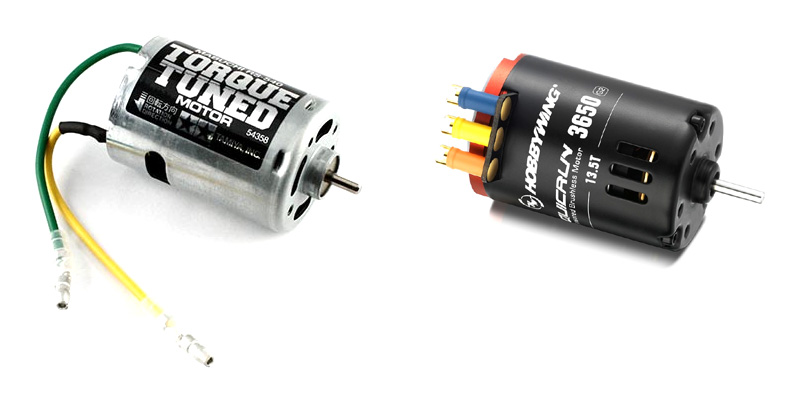
Another thing to decide on is brushless or brushed, but with the development in brushless technology over the past 15 years, in most cases this is no longer a factor to spend much time considering. Unless you use your car in some very specific class or conditions, we’ll almost always recommend a brushless setup. Do remember though, that if you are changing from a brushed to a brushless motor, you will also have to get a brushless ESC.

Brushless motors are available sensored or sensorless, the difference being that the sensored motors have sensors inside the motor that register the position of the rotor. The sensored motors are more responsive from low rpm and give a more precise feel, and is therefore used more in competition than the sensorless motors. The sensorless motors are simpler and usually more affordable, and often used in RTR’s and for more general hobby use.
Again, it's important to remember that motor and ESC needs to be compatible. Some ESC's can only power sensorless motors, while other only work with sensored motors.

The power of a motor is usually indicated in “kv” or “turns”, or both. A motor’s kv refers to its rpm per volt of electricity. This means that a 3000Kv motor will spin at 25200rpm at 8.4V (3000 x 8.4 = 25200). Turns are often used in place of kv to indicate power on 540 size motors, especially 1/10 competition motors. The turn number, like 8.5T or 13.5T, refers to the number of times the wire in the motor is wrapped around the stator. To make it simple - the fewer the turns, the more power the motor produces.
With all these turns and kv’s, it’s important to remember that different cars require different things, and it’s not only about rpm’s. The larger and heavier a car is, the more important it will be to have enough torque, meaning that for a heavy 1/8 vehicle, a low kv but high torque motor will often be the better choice.
With any motor choice, it is vitally important to have the right gearing. So if you’re planning to change to a significantly different motor from what you have been running, always remember to change the gearing at the same time, following the motor manufacturer recommendation to start with.
Going to a higher power motor will also shorten runtime on one charge, and produce more heat.
- Product
- Qty in Cart
- Quantity
- Price
- Subtotal
-
On Sale
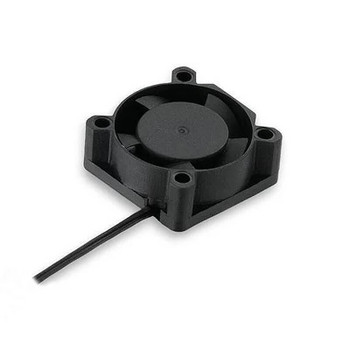
Hobbywing Cyclone Fan 2510BH 6V 20,000 rpm 0.23A Black A (XR10 Pro E) HW30860009
Hobbywing
MSRP: £9.99Now: £9.49Was: £9.99Additional Information - HOBBYWING CYCLONE FAN 2510BH 6V 20,000 RPM 0.23A BLACK A (XR10 PRO E)Hobbywing's patented frameless cooling system. Cyclone cooling fan produces more airflow than a traditional model while consuming equal or less energy.As...HW30860009MSRP: £9.99Now: £9.49Was: £9.99 -
On Sale
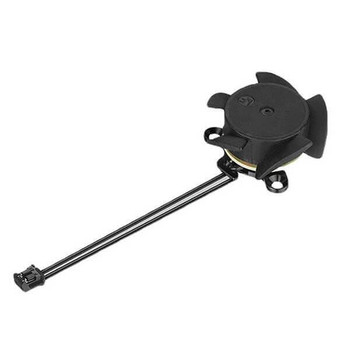
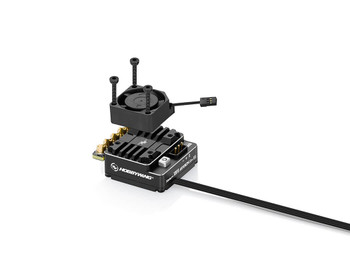
Hobbywing Cyclone Fan 2510BH 6V 16,000 rpm 0.29A Black A (XR10 G2S) HW30860008
Hobbywing
MSRP: £9.99Now: £9.49Was: £9.99Additional Information - HOBBYWING CYCLONE FAN 2510BH 6V 16,000 RPM 0.29A BLACK A (XR10 G2S)Hobbywing's patented frameless cooling system. Cyclone cooling fan produces more airflow than a traditional model while consuming equal or less energy.As result,...HW30860008MSRP: £9.99Now: £9.49Was: £9.99 -
On Sale
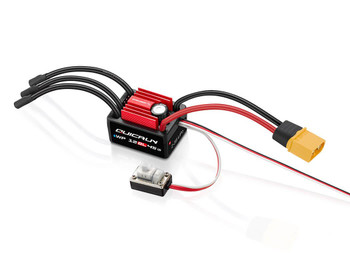
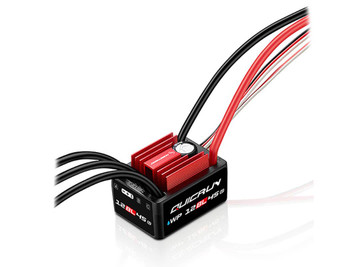
Hobbywing Quicrun WP 12BL45 G2 Brushless S/Less ESC 1/12 1/14 HW30107000 12 24th
Hobbywing
MSRP: £32.99Now: £31.34Was: £32.99Additional Information - HOBBYWING QUICRUN WP 12BL45 G2 BRUSHLESS S/LESS ESC 1/12+1/14Introducing the Hobbywing QuicRun 12BL45 G2 Brushless Waterproof Speed Control.Efficient and intelligent cooling, long-lasting and stable operation.The ESC adopts...HW30107000MSRP: £32.99Now: £31.34Was: £32.99 -
On Sale

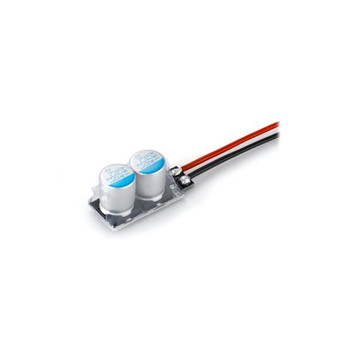
Hobbywing Capacitor Module D For Car Esc 2.1/3.1/10Bl60 HW86030030 29x13x13mm
Hobbywing
MSRP: £5.99Now: £5.69Was: £5.99Additional Information - Sometimes supplied with BLACK head shrink rather than the clear shown.HOBBYWING CAPACITOR MODULE "D" FOR CAR ESC (2.1/3.1/10BL60)This is a replacement Hobbywing Xerun Super Capacitor Module, intended for use with the Xerun series...HW86030030MSRP: £5.99Now: £5.69Was: £5.99 -
On Sale


Hobbywing Multifunction LCD Program Box Pro HW30502002 PC / Bluetooth Bat Meter
Hobbywing
MSRP: £39.99Now: £37.99Was: £39.99Additional Information - HOBBYWING MULTIFUNCTION LCD PROGRAM BOX PROFeaturesAs an independent parameter adjustment device, directly use the built-in LCD screen to display, set, and share ESC parameters (import).Connect the ESC to a computer using a USB...HW30502002MSRP: £39.99Now: £37.99Was: £39.99 -
On Sale
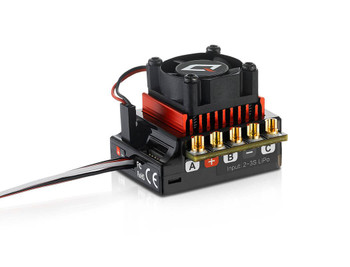
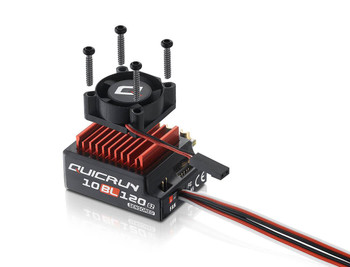
Hobbywing Quicrun 10BL120 G2 Brushless Sensored / Sensorless ESC HW30125002
Hobbywing
MSRP: £54.99Now: £49.99Was: £54.99Additional Information - HOBBYWING QUICRUN 10BL120 G2 BRUSHLESS SENSORED/SENSORLESS ESCThe QuicRun 10BL120 sensored ESC was specially designed for beginners and intermediate modelers. This is the new G2 upgraded version of the speed controller and brings...HW30125002MSRP: £54.99Now: £49.99Was: £54.99 -
On Sale
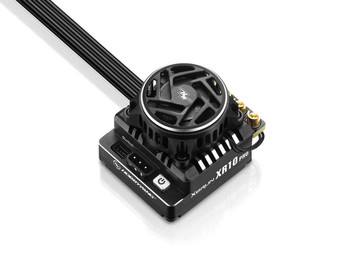
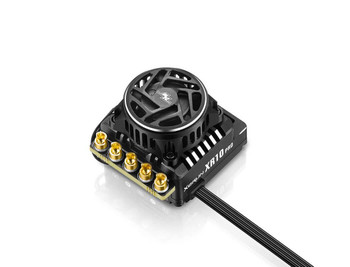
Hobbywing XERUN XR10 Pro Black G3 Speed Control MODIFIED HW30112619
Hobbywing
MSRP: £209.99Now: £188.99Was: £209.99Additional Information - HOBBYWING XERUN XR10 PRO BLACK G3 SPEED CONTROL (MODIFIED)SpecificationsProduct Number:30112619Type: Scale:1/10thBrushed/Brushless:BLClass:Ideal for ModifiedSensored/Sensorless:SDWaterproof:NOCont./Peak Current:160A/1200AInput...HW30112619MSRP: £209.99Now: £188.99Was: £209.99 -
On Sale
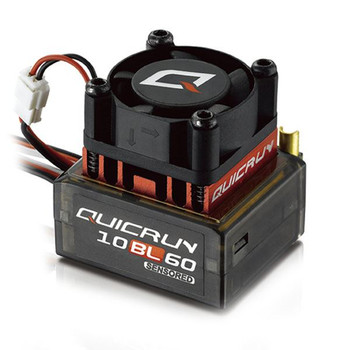
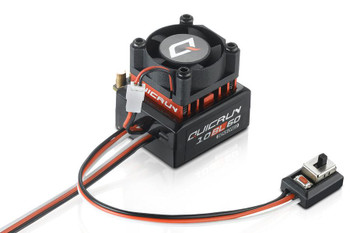
Hobbywing Quicrun 10BL60 Sensored 60amp Brushless ESC HW30108000 60A 1060
Hobbywing
MSRP: £39.99Now: £34.99Was: £39.99Additional Information - HOBBYWING QUICRUN-10BL60 SENSORED 60A BRUSHLESS ESCThe QuicRun 10BL60 sensored ESC is specially designed for new beginners and intermediate modelers. This speed controller is designed for practice and daily training of 1/10th,...HW30108000MSRP: £39.99Now: £34.99Was: £39.99 -
On Sale


Hobbywing Quicrun WP 10B60 G2 Brushless Sensorless ESC (60A) HW30107300 1060
Hobbywing
MSRP: £54.99Now: £52.24Was: £54.99Additional Information - This is Hobbywing 1/10 QuicRun WP-10BL60 G2 Brushless WaterProof 60A ESC For 1/10 RC Onroad Buggy Short Course. The intelligent freewheeling technology enables the ESC to be able to achieve higher driving efficiency at a lower...HW30107300MSRP: £54.99Now: £52.24Was: £54.99 -
On Sale

FTX Tracer Brushless ESC / Receiver FTX9785 Monster Truck Truggy controller
FTX
MSRP: £25.99Now: £24.69Was: £25.99Additional Information - FTX Tracer Brushless ESC/Receiver FTX9785Note this is only compatible with the Tracer Brushless Motor FTX9786 this will not work with the stock brushed motor FTX9733. Also FTX9784 brushless servo is required as the stock servo...FTX9785MSRP: £25.99Now: £24.69Was: £25.99 -
On Sale
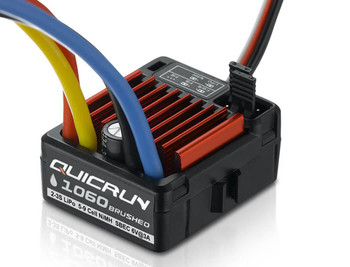
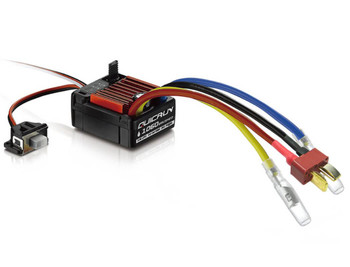
Hobbywing Quicrun 1060 Brushed Sbec WP ESC 60A T-Plug Deans HW30120203 Crawler
Hobbywing
MSRP: £24.99Now: £22.99Was: £24.99Additional Information - HOBBYWING QUICRUN 1060 BRUSHED SBEC WP ESC (60A) T-PLUGThe QuicRun WP 1060 is specially designed for new beginners and intermediate modelers. This speed controller is designed for 1/10th scale touring cars, buggies, short-course...HW30120203MSRP: £24.99Now: £22.99Was: £24.99 -
Out of Stock - On Order with SupplierOn Sale


Hobbywing XERun XR8 Pro G3 Speed Control BLACK HW30113400 8th RC Race ESC
Hobbywing
MSRP: £144.99Now: £137.74Was: £144.99Additional Information - HOBBYWING XERUN XR8 PRO G3 SPEED CONTROL - BLACKSPECIFICATIONSHW30113400MSRP: £144.99Now: £137.74Was: £144.99Qty in Cart: 0Quantity:Price:MSRP: £144.99Now: £137.74Was: £144.99Subtotal: -
On Sale


Hobbywing XERun XR10 Pro V4 G2S Speed Control BLACK HW30112613 10th race car ESC
Hobbywing
MSRP: £219.99Now: £208.99Was: £219.99Additional Information - HOBBYWING XERUN XR10 PRO V4 G2S SPEED CONTROL - BLACKFEATURES10 select-to-use profiles applicable to all 1/10th RC car racing.Internal electronic key switch for long service life, high reliability; and the external switch port...HW30112613MSRP: £219.99Now: £208.99Was: £219.99 -
On Sale


Hobbywing XERun XR10 Pro Speed Control ESC BLACK HW30112600 10th Touring car
Hobbywing
MSRP: £139.99Now: £132.99Was: £139.99Additional Information - HOBBYWING XERUN XR10 PRO SPEED CONTROL - BLACKReliable hardware combined with intelligent software (containing 10 common select-to-use profiles) creates an ideal power solution to 1/10th scale top touring car, Pan car and buggy...HW30112600MSRP: £139.99Now: £132.99Was: £139.99 -
On Sale
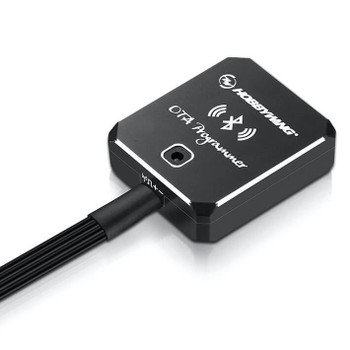
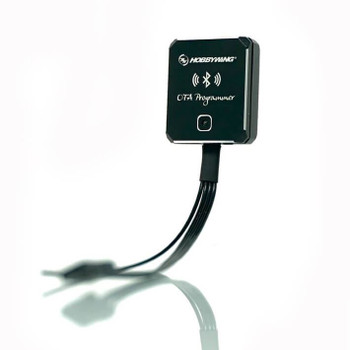
Hobbywing OTA Programmer HW30850400
Hobbywing
MSRP: £39.99Now: £37.99Was: £44.99Additional Information - HOBBYWING OTA PROGRAMMERThe Hobbywing OTA Programmer is a module which connects via Bluetooth communication technology for transferring data between your ESC and a smart device (Android/IOS phone, tablet etc). It makes wireless...HW30850400MSRP: £39.99Now: £37.99Was: £44.99 -

Hobbywing 1/10th XERUN Switch Non-Waterproof HW30850003 Power Programming
Hobbywing
RRP £4.99Additional Information - HOBBYWING 1/10TH XERUN SWITCH (NON-WATERPROOF) Replacement Hobbywing power switch SPECIFICATIONS Supported ESC:Xerun 120A V2.1, 90A, 60A, Ezrun 18A, Justock, Xtreme, QuicRunHW30850003RRP £4.99 -

Hobbywing VBAR Neo Connection Cable Wire HW30810001 HW Platinum ESC
Hobbywing
RRP £6.49Additional Information - HOBBYWING VBAR NEO CONNECTION CABLE/WIRE The VBAR Cable accessories is for HW Platinum ESC's.The VBAR supports the real-time transmission of Hobbywing telemetry data from Mikado's Vbar-control remote Control.Only the Platinum...HW30810001RRP £6.49 -

Etronix Female XT90 Bridging Adaptor w/ 10G Wire ET0857 XT-90 RC Plug connector
Etronix
RRP £2.50Additional Information - ETRONIX FEMALE XT90 BRIDGING ADAPTOR W/10G WIRE ET0857This is a briging cable 10G wire on a remale XT90 connector. Sometimes called a Loop Lead XT-90.The XT90 Bind Plug Loop Connector is designed to short circuit...ET0857RRP £2.50 -


Etronix Female XT-60 To Male EC5 Plug Connector Adaptor ET0842EC5 XT60 EC 5 Plug
Etronix
RRP £3.75Additional Information - ETRONIX FEMALE XT-60 TO MALE EC5 PLUG CONNECTOR ADAPTOR ET0842EC5Male EC5 (as fitted to a ESC) and Female XT-60 (as fitted to an battery)14 AWG Cable.100mm long.ET0842EC5RRP £3.75 -
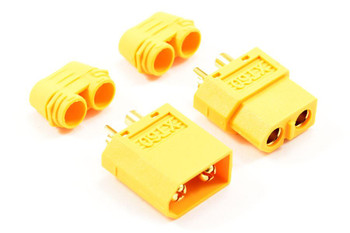
Etronix XT-60 Connector Male & Female w/ Protective Sleeve ET0796P XT60 Plug RC
Etronix
RRP £2.25Additional Information - ETRONIX XT-60 CONNECTOR (MALE/FEMALE) W/PROTECTIVE SLEEVE ET0796P Male XT-60 (as fitted to a ESC) and Female XT-60 (as fitted to an battery). These are supplied with protective covers for the soldering locations. XT-60...ET0796PRRP £2.25 -


Etronix CSG Countersteer Gyro ET0078 help beginners stay straight FTX Sidewinder
Etronix
RRP £15.99Additional Information - ETRONIX CSG COUNTERSTEER GYRO The Etronix CSG Countersteer Gyro allows you to drive your RC car with more confidence, the CSG's hold effect manages the steering output by automatically keeping the car’s tires aligned in...ET0078RRP £15.99 -
On Sale

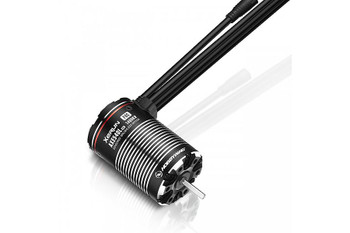
Hobbywing Xerun AXE 540L 1400Kv R2 FOC Sensored B/Less Combo HW38020311
Hobbywing
MSRP: £227.99Now: £204.99Was: £227.99Additional Information - HOBBYWING XERUN AXE540L 1400KV R2 FOC SENSORED B/LESS COMBOSPECIFICATIONSESC DataType:Brushless FOCMax cont/peak current:80A/480ACells count:2s-3s LiPo, 6-9 Zellen NiMHMotor limit:For XeRun-AXE "R2" rangeBEC:6V/7.4V with...HW38020311MSRP: £227.99Now: £204.99Was: £227.99 -
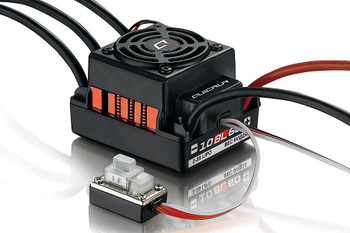

Hobbywing Quicrun WP 10BL60 Waterproof 60A Brushless ESC HW30107100 HW
Hobbywing
MSRP: £55.99RRP £51.99Additional Information - HOBBYWING QUICRUN-WP-10BL60 WATERPROOF 60A BRUSHLESS ESCThe QuicRun WP 10BL60 ESC brushless sensorless is specially designed for new beginners and intermediate modelers. This ESC is applicable to all-weather sport of 1/10th short...HW30107100MSRP: £55.99RRP £51.99 -
On Sale


Outcry Extreme Speed Controller ESC w/ Program Card Z-E0118 RC4WD 2-3S 80A XT60
RC4WD
MSRP: £87.99Now: £83.59Was: £87.99Additional Information - Outcry Extreme Speed Controller ESC w/ Program CardThis new Outcry III Water-resistant ESC features great characteristics for scale trail driving, making it the perfect choice for any scale build!Specifications: Input Voltage:...Z-E0118MSRP: £87.99Now: £83.59Was: £87.99 -
On Sale


JDModel Earth Digger 4200XL Excavator Earth Dozer Brushed ESC RC4WD VVV-S0011
RC4WD
MSRP: £51.99Now: £49.39Was: £51.99Additional Information - Earth Digger 4200XL Brushed ESC Specifications:Input voltage: 7.4-11.1V (3S Lipo)Build in 2A 5V BECBuildin FaisafeContinous current: 40AWhat's Included:1x Earth Digger 4200XL Brushed ESCNotes:Each Earth Digger uses 3 brushed...VVV-S0011MSRP: £51.99Now: £49.39Was: £51.99
